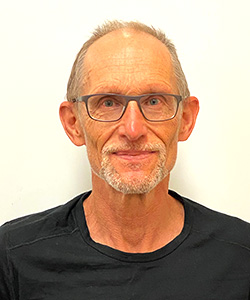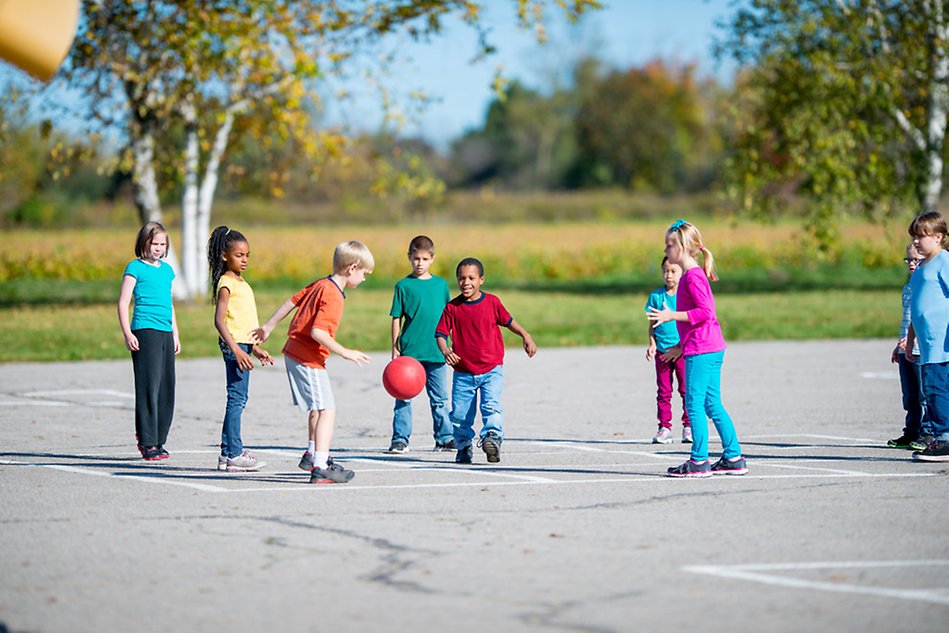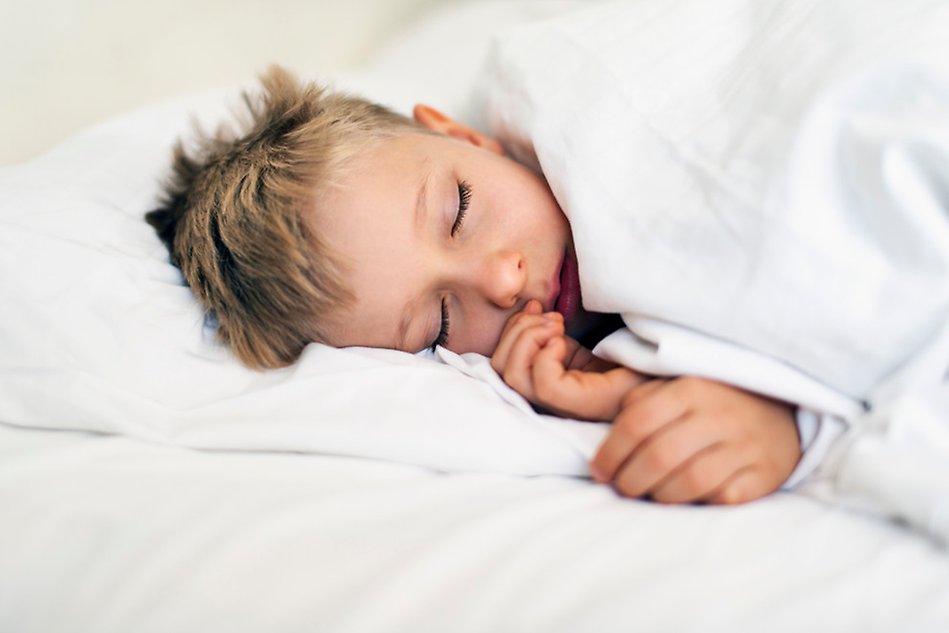Weighted blankets, sleep, and ADHD
For children with ADHD, the school day is often challenging because they have difficulty sitting still and concentrating. Many children with ADHD also suffer from sleep problems that affect their health, well-being, daily functioning and overall quality of life. Research collaboration between Halmstad University and BUP (child and adolescent psychiatry) in Region Halland shows that weighted blankets are an effective alternative to medical treatment for children with ADHD and sleep problems.
"For me and my colleagues, it has been particularly gratifying to hear that both the children and the parents who participated in our study so clearly express that they have been helped, that the children sleep better when they use weighted blankets and that the parents experience less stress and increased well-being."
Ingrid Larsson, Professor of Health and Lifestyle
Collaboration between researchers and BUP

Håkan Jarbin, Chief Physician, Region Halland.
School children and ADHD
In Sweden, five to seven percent of school-age children are diagnosed with ADHD. In the 2022/2023 academic year, this corresponds to approximately 55,000 to 78,000 children in compulsory school. For children with ADHD, the school day is often a challenge because the children have difficulty sitting still and concentrating, which in turn affects their ability to learn. In addition, many children with ADHD suffer from sleep problems that lead to daytime fatigue and affect their health, well-being, daily functioning and overall quality of life.
"Sleep problems are common in ADHD and around half of those with ADHD have sleep problems because they find it difficult to wind down in the evening. This can also be very difficult for the parents, when bedtime takes a long time and you get too little sleep, which seriously affects how you function the next day", says Håkan Jarbin, Chief Physician at BUP in Region Halland.
Alternatives to medicine
To alleviate sleep problems, doctors often prescribe melatonin to children and adolescents. However, melatonin has side effects such as headaches, nausea and fatigue. In many cases, the children's parents also want to avoid medication. Being able to offer an alternative to medical treatment for sleep problems for children with ADHD is therefore of great value.

Photo: Istock
Research collaboration between Halmstad University and BUP in Region Halland shows that weighted blankets are an effective alternative to medical treatment for children with ADHD and sleep problems.
Lack of research on weighted blankets
Even though weighted blankets have been used in healthcare for a long time as an alternative to medical treatment to help children and adolescents with ADHD and sleep problems, there has been a lack of research on the use of weighted blankets and thus also a lack of scientific evidence that weighted blankets really help with sleep problems. Due to this lack of evidence, the Swedish Medical Products Agency recommended in 2020 that the regions should stop prescribing subsidised weighted blankets as a treatment for sleep problems. Since 2022, healthcare providers can therefore no longer prescribe weighted blankets to children and adolescents with ADHD and sleep problems.

Photo: Istock
"Too little sleep seriously affects how you function the next day."
Håkan Jarbin, Chief Physician, Region Halland
Strengthening knowledge and the National Board of Health and Welfare
To strengthen the knowledge base so that the National Board of Health and Welfare hopefully eventually can reintroduce the possibility for healthcare to prescribe weighted blankets, researchers at Halmstad University have collaborated with BUP in Region Halland. The researchers have studied the effect of using weighted blankets as an alternative to alleviate sleep problems in children with ADHD. 94 children have been included in the study who have slept with both regular blankets and weighted blankets, which has enabled the researchers to study the difference.

Ingrid Larsson, Professor.
"Overall, our collected data showed that the weighted blankets were effective and the children's sleep problems and awakenings during the night decreased while the children's total sleep time and sleep efficiency increased", says Ingrid Larsson, Professor of Health and Lifestyle at Halmstad University.
"For me and my colleagues, it has been particularly gratifying to hear that both the children and the parents who participated in our study so clearly express that they have been helped, that the children sleep better when they use weighted blankets and that the parents experience less stress and increased well-being. And it is gratifying that both the parents, the children and the school staff feel that the children function better in everyday life and at school", says Ingrid Larsson.
The research behind it – scientific publications
Lönn, M., Svedberg, P., Nygren, J., Jarbin, H., Aili, K., & Larsson, I. (2024). Changed sleep according to weighted blanket adherence in a 16-week sleep intervention among children with attention-deficit/hyperactivity disorder. Journal of Clinical Sleep Medicine. 20(9):1455–1466. https://doi.org/10.5664/jcsm.11186 External link.
Lönn, M., Aili, K., Svedberg, P., Nygren, J., Jarbin, H., & Larsson, I. (2024). The efficacy of weighted blankets for sleep in children with ADHD – a randomised controlled cross-over trial, Journal of Sleep Research, 33(2):e13990. doi: 10.1111/jsr.13990.
Larsson, I., Svedberg, P., Nygren, J.M., & Malmborg S, J. (2024. Validity and reliability of the Swedish version of the Children’s Sleep Habits Questionnaire (CSHQ-SWE). BMC Peadiatric, 24(1), 378 https://doi.org/10.1186/s12887-024-04859-z External link.
Lindholm, A., Jarbin, H., Aili, K., Nygren, J.M., Svedberg, P., & Larsson, I. (2024). Sex Differences in Children with Uncomplicated Attention Deficit/Hyperactivity Disorder and Sleep Problems. Children, 11, 636. https://doi.org/10.3390/children11060636 External link.
Lönn, M., Aili, K., Svedberg, P., Nygren, J., Jarbin, H., & Larsson, I. (2023). Experiences of Using Weighted Blankets among Children with ADHD and Sleeping Difficulties. Occupational Therapy International, 1945290. doi:10.1155/2023/1945290
Larsson, I., Aili, K., Lönn, M., Svedberg, P., Nygren, J.M., Ivarsson, A., & Johansson, P. (2023). Sleep interventions for children with attention deficit hyperactivity disorder (ADHD): A systematic literature review. Sleep Medicine, 102:64-75 https://doi.org/10.1016/j.sleep.2022.12.021 External link.
Harris, U., Svedberg, P., Aili, K., Nygren, J.M., & Larsson, I. (2022). Parents’ Experiences of Direct and Indirect Implications of Sleep Quality on the Health of Children with ADHD: A Qualitative Study. Int. J. Environ. Res. Public Health 19, 15099.
Larsson, I., Aili, K., Nygren, J.M, Jarbin, H., & Svedberg, P. (2021). Parents’ experiences of the weighted blankets’ impact on children with attention-deficit/hyperactivity disorder (ADHD) and sleep problems –a qualitative study. Journal of Environmental Research and Public Health,18, 12959. https://doi.org/10.3390/ijerph182412959 External link.
Larsson, I., Aili, K., Nygren, J.M, Johansson, P., Jarbin, H., & Svedberg, P. (2022). SLEEP - An intervention with weighted blankets for children with Attention Deficit Hyperactivity Disorder (ADHD) and sleep problems: study protocol for a randomised control trial. BMJ Open 12:e047509. doi:10.1136/bmjopen-2020-047509

